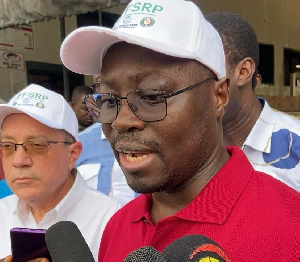I have observed with keen interest in recent years, purported attempts at poverty alleviation in Ghana. From one region to another, expensive seminars have been held to find ways to alleviate poverty among our citizenry. It is indeed a noble pursuit. But you look at the people who attend such seminars, and the presentations and you wonder if it?s a genuine commitment, since the poor are not represented. Interestingly, a number of white papers have been issued, but as to when they will become effective or achieve the desired end is questionable. The said attempt has been since time immemorial among governments and world bodies and one wonders practically what they have achieved hitherto. What is essential is helping raise the living standard of our people, and that by every necessary means and laudable approach. And we need not look elsewhere, but within our frontiers first.
It is sometimes funny and interesting as our leadership act and talk, hoping some country will give us money to improve the lot of our people. It is very clear that the interest of the ordinary citizen is of little importance to our leadership. The answer to poverty alleviation in Ghana is in we all, leadership and sundry accepting and living within our means. In the present Ghana, our leadership and management live as the kings and nobles of the old Roman Empire. Their entitlements (luxurious cars, mansions and standard of living) cannot be tampered with; they look elsewhere to get some funding to build our land. We cannot denounce the performance of past administrations and still use their exploitative greed formulas to share our wealth. The Emergent Ghana is about equity; revising the formula for sharing the limited income we generate and that fairly. We can never be equal, but the limited income can be better shared among the workforce. Then also all Ghanaians will pay appropriate taxes and service charges.
What I found objectionable about the seminars was its failure to address the ratio of the worth of the manager to the labourer. Whatever the case, there is a limited resource or generated income to be shared among the workforce. Thus importantly to be considered, if poverty alleviation is to be effective is the ratio of sharing the wealth. I have good knowledge of a case in an institution in Ghana where after some work was executed, the director earned twenty five million cedis (?25,000,000) and the lowest paid labourer earned two hundred thousand cedis (?200,000). Thus the ratio of the worth of the director to the labourer is 125:1. Now suppose this labourer is below the poverty line and is indeed, what wealth is it that when we continue to share in this ratio, the labourer will cross over the poverty line? May be in the world beyond!
I have first hand information at an institution where after a job, the head was paid seven million cedis (?7,000,000) and the lowest paid (university graduate) received seven hundred thousand cedis (?700,000). Here also the ratio is 10:1. Thus from the above real instances in Ghana it is impracticable to realize poverty alleviation if the ratios of sharing our wealth are not revised. Invariably, the head only plays a supervisory role whilst the labourer does the raw work. The Emergent Ghana is not proposing equal sharing but in the latter instance a ratio of 7:4 would have been helpful and a practical approach to alleviate poverty. In the former instance, a ratio of 5:2 would do. To help buttress the above issue as the critical and leading factor to address, it will be helpful if some media houses will collect and make public the total amount spent on the directors of Volta River Authority, Bank of Ghana, Social Security and National Insurance Trust, The Customs Excise and Preventive Service, the University of Ghana and Ministries etc. Similarly, they should make public the total amount spent on the lowest ranked worker in the said institution. Then let all compute the ratios of the worth of the director to the labourer. These are not for any intended purpose than to help all Ghanaians realize that addressing the ratio is one great solution to poverty alleviation in Ghana. It is not primarily about their salaries but all that is spent on them in accommodation, transport, health, services and comfort, including families. We have to take the bull by the horns, if we genuinely are committed to poverty alleviation in Ghana. It?s about making life relatively bearable for every productive Ghanaian. It?s about appreciating that everyone?s role is vital, and all need not grapple to bear rule. The Emergent Ghana is remunerating everyone fairly and equitably within the available resources. It?s about creating wealth to share and spend. We have to apply knowledge and indisputable positive initiatives to improve the life of our people. These are the real issues to be pursued to alleviate poverty among our kinsfolk. With similar approach to our resources we will be able to develop and sustain all sectors of the country. Our management and leadership can not continue to live without frontiers or with discriminatory measures in finances and hope to alleviate poverty among our people. Let the measure apply to the leadership and management in every respect and not selectively as practiced presently; from accommodation allowances through entertainment allowances to utilities.
The other issue bothering our workforce is the present stances of cheap-labour in Ghana. We have to scrutinize it properly to avoid the exploitation of our people as availability of cheap-labour in Ghana. I have once said the availability of a resource is no prescription for under pricing, neither is the scarcity of a resource the sure bases for over pricing. Humans are not commodities, and their worth is priceless. Our human resource base is a great asset and the earlier they are priced properly, the better. If they are productive, then they deserve to be paid appropriately and not robbed of what is due them, in the name of cheap-labour. The Emergent Ghana is about paying salaries according to output. We are not asking emerging enterprises to pay wages that will see them fold up. However, policies have to be formulated such that as such enterprises stabilize and become profitable, they will pay the workforce appropriately. There is no way given the proper materials and right instruction labour will not optimize production.
We are very much familiar with the undesirable performance of the workforce and the poor attitude to work. Many Ghanaians have complained about the laxity with which some workers report to work, non performance even though present and unacceptable treatment of customers. The Emergent Ghana looks for legislative instruments that authorize the head to promptly dismiss or release any non performing worker. These instruments will have to make room for appropriate punitive sanctions to take in the shortest possible time at eliminating every hindrance to work progress. The bill should provide places to receive customer reports. Thus efficiency and punctuality will be cultivated in the Ghanaian workforce.
The Labour Front will have to be discreet on their reaction to the above bill since no one will be eager to get rid of a hardworking employee. The Emergent Ghana is about building a nation with responsible citizens. Ghanaians are the only people that can and have the potential to build the dreamland for Ghanaians. Just as the Asian tigers have done, we are the African eagle, and the eagle when it decides to fly, does not respect the law of gravity. It reaches the highest heights with delight. It is time for the African eagle to soar, to improve the life of our people, develop mother Ghana and bless humanity. We are able.
Impossible is nothing!















